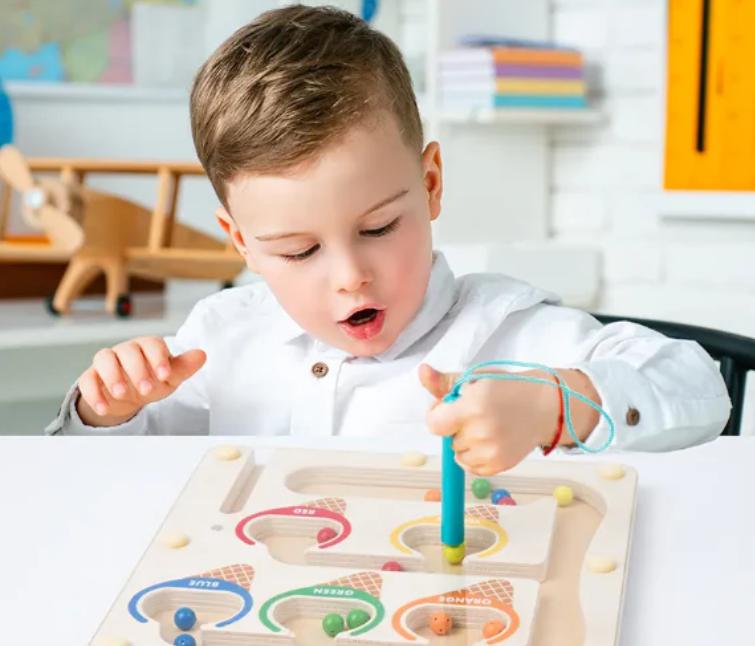When choosing toys for children, the debate between Montessori wooden toys and plastic toys is a topic that many parents and educators explore. Understanding the benefits and drawbacks of each option can significantly impact a child's development and play experience. In this article, we will delve into the attributes of Montessori wooden toys, compare them with their plastic counterparts, and explore why they might be the preferred choice for nurturing young minds.
The Essence of Montessori Wooden Toys
Montessori wooden toys are designed with a strong emphasis on education, sensory exploration, and creativity. Rooted in the Montessori method of education, these toys promote hands-on learning and are crafted to engage children's natural curiosity. Wood's tactile nature offers a unique sensory experience that encourages kids to explore textures, weights, and sounds. Children can use their imagination to create stories and scenarios, enriching their playtime in ways that plastic toys often cannot.
Montessori wooden toys are often made from sustainable materials, resonating with the growing awareness of environmental responsibility. Parents increasingly seek toys that are safe for their children and environmentally friendly. Wood's durability ensures that these toys can withstand the rigors of play, often lasting for generations. This longevity makes them a wise investment and reduces waste associated with discarded plastic toys.
Moreover, Montessori wooden toys typically promote open-ended play. Unlike many plastic toys that come from specific characters or themes, wooden toys provide endless possibilities for imaginative play. Children can create their narratives, fostering creativity and problem-solving skills. This open-ended nature aligns perfectly with the Montessori philosophy, encouraging children to explore their interests and develop a sense of independence.
The Case for Plastic Toys
Plastic toys, on the other hand, have their own advantages. They are often colorful and lightweight and can be molded into a variety of shapes and designs that appeal to children's preferences. Many plastic toys come equipped with lights and sounds, capturing a child's attention and enhancing their play experience. However, the allure of plastic toys comes with important considerations.
While plastic toys are generally more affordable and widely available, they can pose several drawbacks. Many plastic toys are made from non-biodegradable materials, contributing to environmental pollution. They are also often manufactured with chemicals that may be unsafe for children. Parents should be vigilant and choose plastic toys that meet safety standards to ensure their children's well-being.
Additionally, plastic toys can sometimes limit creativity. Many plastic toys are designed for specific purposes, which can constrain a child's imaginative play. For instance, toys that require batteries or have pre-set functions may divert attention away from open-ended exploration, leading to a more passive play experience. In contrast, Montessori wooden toys encourage children to engage actively in their play, nurturing skills that benefit their cognitive and emotional development.
Educational Benefits of Montessori Wooden Toys
One significant advantage of Montessori wooden toys is their ability to support a child's educational journey. These toys often focus on essential developmental milestones, such as fine motor skills, hand-eye coordination, and cognitive reasoning. For example, a Montessori educational wooden toolset can help children practice their skills while engaging in pretend play that mirrors real-life activities.
The appeal of Montessori wooden toys extends beyond just physical development. Many wooden toys incorporate educational elements, such as colors, shapes, and numbers, providing opportunities for children to learn through play. Engaging with these toys can foster a love for learning that carries through into their later educational experiences. The Montessori approach emphasizes learning and instills values of respect, empathy, and cultural awareness, all of which are embedded in the design of Montessori wooden toys.
Parents often find that the simplicity of Montessori wooden toys allows for deeper connections during playtime. When children are engaged in imaginative play with their parents or caregivers, it creates opportunities for bonding and communication. This shared experience can enhance emotional intelligence and social skills as children learn to navigate their feelings and interact with others in a supportive environment.
Making the Right Choice for Your Child
Choosing between Montessori wooden toys and plastic toys ultimately depends on your values and learning goals for your child. Montessori wooden toys may be the better option if you prioritize creativity, sustainability, and educational value. They provide a rich sensory experience and promote independent thinking and problem-solving skills.
However, it is also essential to recognize that plastic toys can play a role in a child's development when chosen wisely. Many parents find a balance by integrating both types of toys into their child's playtime. This approach allows children to benefit from the stimulating features of plastic toys while engaging with the open-ended nature of Montessori wooden toys.
As a parent, observing your child's interests and play preferences can guide your decisions. If your child gravitates toward imaginative play, consider investing in various Montessori wooden toys that align with their curiosity. Alternatively, carefully selected plastic toys can complement their play experience if they enjoy interactive features and bright colors.
The Lasting Impact of Play
Ultimately, the choice between Montessori wooden toys and plastic toys comes down to the impact on your child's development and enjoyment. By selecting toys that align with your values and educational philosophy, you provide your child opportunities for growth, exploration, and connection. Montessori wooden toys, emphasizing creativity, sustainability, and education, offer a unique avenue for children to thrive in their formative years.
At Toy Vault, we understand the importance of providing children with high-quality educational toys that inspire and engage. Our collection of Montessori wooden toys is thoughtfully designed to celebrate diversity, promote empathy, and nurture a love for learning. Explore our products to find the perfect toys that resonate with your child's unique interests and developmental needs.
Choosing the right toys is not just about play; it’s about creating an enriching environment that fosters growth and imagination.

